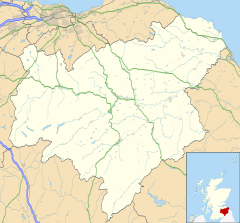Hutton, Scottish Borders facts for kids
Quick facts for kids Hutton |
|
|---|---|
| OS grid reference | NT9154 |
| Council area | |
| Lieutenancy area | |
| Country | Scotland |
| Sovereign state | United Kingdom |
| Post town | BERWICK-UPON-TWEED |
| Postcode district | TD15 |
| Dialling code | 01289 |
| Police | Lothian and Borders |
| Fire | Lothian and Borders |
| Ambulance | Scottish |
| EU Parliament | Scotland |
| UK Parliament |
|
| Scottish Parliament | |
Hutton is a small, traditional village located in the Scottish Borders region of Scotland. It's a peaceful country village surrounded by green farmland.
Contents
Where is Hutton?
Hutton is located in the beautiful Scottish Borders. It's about one mile west of Paxton and two miles west of the border with Northumberland, which is a county in England. The closest towns where people go for shopping and services are Duns and Berwick-upon-Tweed.
Life in Hutton Village
Hutton has a lovely village hall that was recently updated. It's used for many fun social events and community gatherings. Although Hutton Primary School closed in 2005, the village is still a lively place. It has a local church, a park for playing, and a friendly, traditional feel.
Hutton Church: A Place of History
The church in Hutton has a long and interesting history. The very first church here was officially opened by David de Bernham, who was the Bishop of St Andrews, way back on April 6, 1243.
Early Church Days
Imagine going to church without seats! In 1652, seats were finally put into the Parish Church. Before that, people had to bring their own chairs or stand. Between 1655 and 1660, the old church was repaired. They even added a balcony on one side and fixed the roof with new thatch.
Building a New Church
In 1765, a new church was built to replace the old one. This new church could hold 400 people. It had a dirt floor, plain walls, no ceiling, and a thatched roof. Later, in 1791, a paved floor was added, and the walls and ceiling were plastered. However, this church eventually fell into disrepair and was taken down in 1834.
The Church Today
The church you see in Hutton today was built in 1835. It was designed by an architect named Ignatius Bonomi. He was inspired by the design of Norham Church, another beautiful building he worked on.
The church has a special bell with an old inscription on it. It says: "SOLI . DEO . GLORIA . IOHANNES . BURGERHUYS . ME . FECIT . 1661 ." This means "Glory to God alone. Johannes Burgerhuys made me. 1661."
The Churchyard
The churchyard around Hutton Church is a historic and peaceful place. It has many old gravestones from the 1700s and 1800s.
Some interesting memorials include:
- James Frisken, from 1712, with a detailed carving of a person surrounded by angels.
- John Burn, from 1733, showing a full-length portrait with an open book.
- The Hutton Hall (castle) Burial Vault, located north-west of the church, which is thought to be from the 1600s.
Near the church is Antrim House, which used to be the home for the church minister. It was built in 1876 by John Lessels. In 1931, Constance, Lady Burrell helped pay for a new church hall to be built.
Hutton's History
Hutton has played a small part in bigger historical events.
Napoleon's Invasion Scare
In 1804, there was a false alarm that Napoleon was invading Britain. A warning signal was sent from Hume Castle. When the local volunteers gathered to defend the area, Hutton was their meeting point. They even spent a night ready for battle inside the old church.
World War II Connection
More recently, during World War II, Hutton became popular with Polish soldiers. They were stationed at a nearby camp called Winfield. After the war ended, some of these soldiers decided to stay and live in the village.
A Traditional Rhyme
There's an old traditional rhyme about Hutton and nearby places: Hutton for old wives, Broadmeadows for swine, Paxton for drucken wives And salmon sae fine. Crossrig for lint and woo' Spittal for kale, Sunwick for cakes and cheese And lasses for sale.
Famous People from Hutton
Many interesting people have connections to Hutton:
- John Blair (1849-1934) was a Scottish landscape artist who was born in Hutton.
- Andrew Forman (1465-1521) was an important religious leader who became the Archbishop of St Andrews.
- Sir William Burrell was a very successful shipping businessman and a generous person who owned Hutton Castle nearby. He passed away there in 1958.
- Dudley Marjoribanks, 1st Baron Tweedmouth bought the Hutton Hall estate in 1876.
- The famous bear Wojtek (soldier bear), who was a soldier in the Polish army, was stationed in Hutton during World War II.
- Sir William and Constance, Lady Burrell were active members of the Hutton church.
 | Jewel Prestage |
 | Ella Baker |
 | Fannie Lou Hamer |


